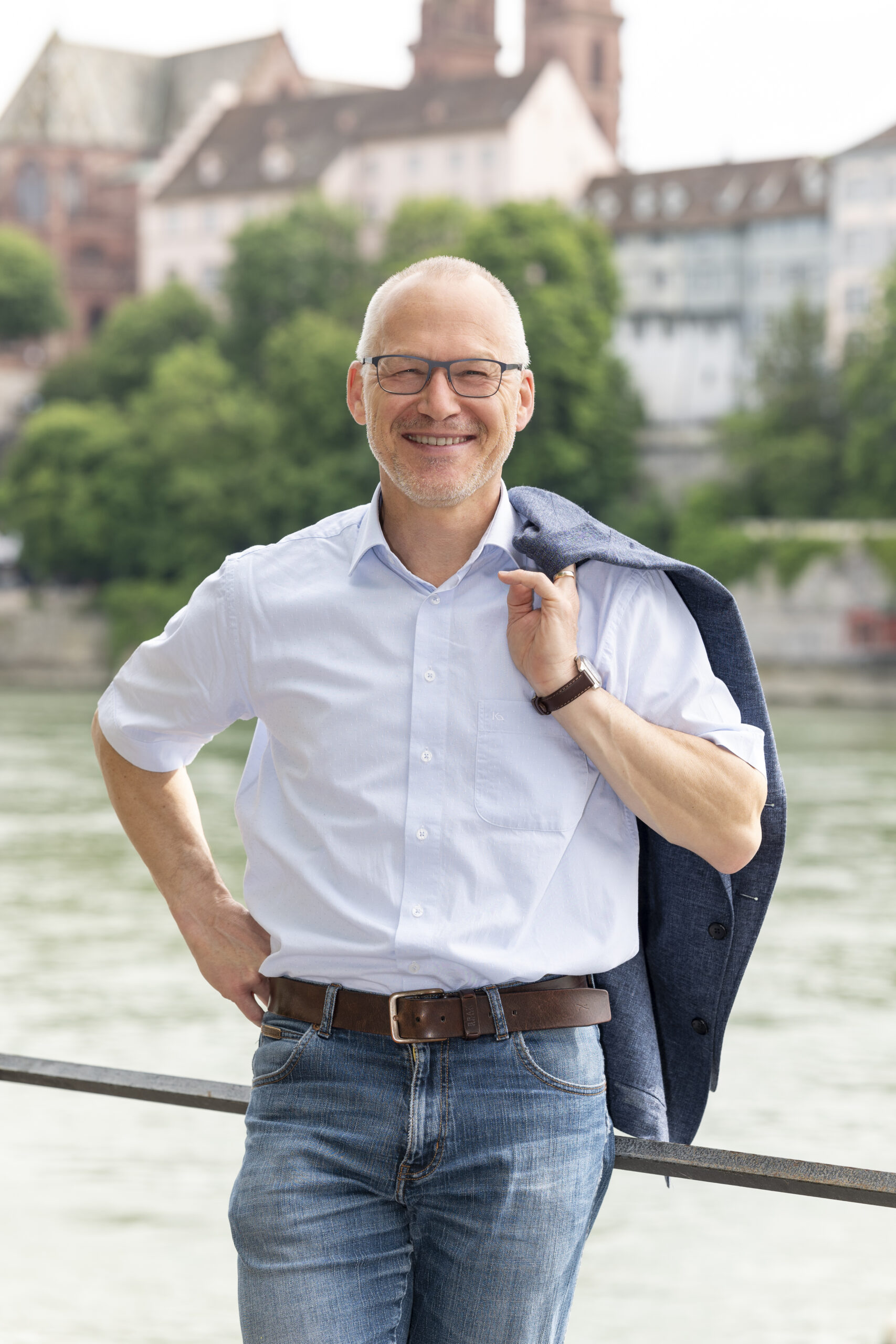Basel Tourism
Convention Bureau Basel
BASEL
Basel – a city of contrasts

Aeschenvorstadt 36
CH-4010 Basel
Phone +41 61 268 68 10
At the heart of Europe, Basel seamlessly combines exceptional accessibility with an outstanding meeting infrastructure, making it an ideal destination for conferences, exhibitions, and business gatherings.
The city’s business clusters
As the first Swiss city to achieve “Sustainable Destination Level III – Leading” and its certification as a sustainable destination by TourCert, the city reflects the local commitment to sustainability. Basel is also developing into an important location for information and communication technology (ICT). The city offers a strong digital infrastructure. With initiatives such as the Switzerland Innovation Park Basel Area and specialized ICT events, the region is growing as an attractive technology hub in Switzerland.
What our city is already known for: It is a world leader in life sciences and home to pharmaceutical giants Novartis and Roche – two of the world’s top five pharmaceutical companies – as well as more than 700 other life sciences companies, the region is a pow- erhouse of research.
Cutting-Edge University Research
The Basel area is a hub for academic excellence and pioneering research. The University of Basel, Switzerland’s oldest university founded in 1460, is complemented by renowned institutions such as the Biozentrum, the Friedrich Miescher Institute for Biomedical Research, the University of Applied Sciences and Arts Northwestern Switzerland, and the University Hospital. Additionally, the Department of Biosystems Science and Engineering of the prestigious ETH Zurich, along with numerous science, technology, and business parks, further enrich Basel’s academic and research landscape.
Meet in Basel: A Premier Conference Destination
Cities that excel in science and business naturally attract high-profile conferences – provided they meet the expectations of today’s event planners. Basel rises to the occasion with its central location, excellent transport links, and state-of-the-art meeting infrastructure. Its compact city layout ensures short distances, making it one of Europe’s leading exhibition and congress destinations. Basel’s appeal extends beyond business: its vibrant cultural scene, including Art Basel – the world’s premier fair for contemporary and modern art – draws hundreds of thousands of visitors annually.
Effortless Accessibility
Thanks to its prime location in Europe, Basel is easily reachable by train from numerous European cities. Integrated into the high-speed rail network, the city benefits from direct connections via the French TGV and German ICE, reducing travel times to just 3 hours from Paris or Frankfurt, and 4 hours from Milan. Furthermore, the EuroAirport Basel-Mulhouse-Freiburg offers convenient connections to major European cities, while Zurich Airport is accessible in just 75 minutes by train.
Free use of public transport
Every guest staying overnight in Basel receives a personal guest card, handed out upon check-in. The attractive features of the BaselCard include free use of public transport, plus a 50% discount on admission to Basel’s museums, Basel Zoo, Theater Basel and much more. With a BaselCard, guests can also rent an e-bike for CHF 20 a day.
The Messe and Congress Center Basel
Switzerland’s largest congress venue by sur- face area, is situated in the city center and offers 25 meeting rooms accommodating up to 5,000 delegates. Additionally, with 1,000 hotel rooms nearby and approximately 9,500 guest rooms available in the region (includ- ing Airbnb accommodations).

Leisure Travel & Meetings: A Perfect Match
Stefan Bonsels
Head of Basel Convention Bureau
Stefan, as Head of the Convention Bureau Basel, you’ve recently been able to hold some major congresses in Basel. Congratulations. Can you give us some insights into how you made this possible? For example, what incentives did you give organisers to choose Basel over other Swiss cities?
Stefan Bonsels: Basel is positioned as a congress city with strong arguments for meeting planers and delegates alike: central location within Europe, short distances within the city, an excellent public transport system that is free of charge for hotel guests (BaselCard). A decisive advantage is the location of Messe and Congress Center Basel in the city centre. This state-of-the-art venue hosts most of the international conferences and is located in walking distance from many hotels. Even the historic city centre is just a short 10-minute walk away.
Furthermore there are solid economic arguments. The Basel region is an internationally recognized hub for science, research, and innovation. The Life Sciences Cluster Basel is home to some of the world’s leading pharmaceutical and biotechnology companies, including Roche and Novartis.These companies drive healthcare innovations and collaborate closely with medical professionals and researchers. This is definitely an attractive environment for medical congresses. And the Government of Basel runs a financial support program for congresses. As early as 2014, the Canton of Basel-Stadt has encouraged and facilitated the development and realisation of congresses in Basel, if they provide benefits to the business location from an economic point of view. By deploying rather modest means, the congress location Basel has continued to gain traction and managed to create a considerably high degree of indirect and direct value added.
How closely does the Convention Bureau collaborate with Basel tourism? Seeing as it is a department of Basel tourism, where would you say the priorities liegeneral tourism or more business, respectively, con vention tourism? Who sets the goals for any particular year?
Stefan Bonsels: The Convention Bureau is part of Basel Tourism, ensuring close integration and collaboration. The strategy of Basel Tourism defines leisure tourism, with a focus on art and architecture, and conference tourism as key areas of active development. Both sectors serve as strategic pillars of the organization. We aim to maintain a balanced mix of visitors in Basel and allocate our resources accordingly. Furthermore, achieving year-round tourism is a key priority. Our positioning as an attractive leisure destination also helps us attract congresses, as the overall appeal of a location plays a significant role. Many conference guests later return as leisure visitors or extend their stays. The success of Basel as a destination depends equally on a strong leisure tourism sector and business events.
If news articles are to be believed, Basel had a record year for tourism in 2024. Is this just a coincidence or is this the result of special efforts that bore fruit? Can you elaborate on what efforts were undertaken please.
Stefan Bonsels: Basel’s strategic focus on positioning itself as a hub for both art and architecture in leisure tourism and the acquisition of congresses has proven highly successful. The city’s ability to attract prestigious events highlights its strong market positioning. The year 2024 was particularly remarkable for business meetings, hosting major con ferences such as European Stroke Organisation Conference, the Annual Meeting of International Association for Medical Education Conference and the Joint Annual Conference of the German, Austrian and Swiss Societies of Hematology and Medical Oncology. Such high-profile events further solidify Basel’s reputation as a premier conference destination and demonstrate its ability to accommodate large-scale, international gatherings.
Whereas Basel is probably best known in the past for its major shows such as Art Basel, Baselworld and MUBA, the latter two sadly do not feature any longer in the annual congress calendar. How has Basel tourism compensated for the losses of such huge events and are there any efforts underway to hold such major events in the future?
Stefan Bonsels: Today, Basel welcomes nearly 10% more visitors than in 2019, before the pandemic. The leisure tourism sector, particularly within the Swiss market, has seen a 20% increase. In addition, the city is hosting more congresses than ever before. To maintain and further develop these events, Basel is actively enhancing its hospitality culture, ensuring a welcoming and dynamic environment for both new and returning conferences.
Basel places great emphasis on creating a welcoming atmosphere for both leisure and business visitors. Initiatives such as the hotel charter and welcome culture program, launched during Art Basel, aim to enhance the overall visitor experience. To engage stakeholders and foster a sense of belonging, Basel introduced the “I’m part of it” movement, particularly for Art Basel, encouraging businesses and local partners to actively participate in promoting the city as a top-tier event destination.
The goal is to make events more visible and tangible throughout the city. This includes initiatives such as flag displays, special guest amenities in hotel rooms, and unique Basel experiences integrated into event programs. One such highlight is the Rhine swimming event for gallerists during Art Basel, offering an authentic and memorable local experience. Furthermore, Basel is committed to ensuring fair and excellent service within the hospitality sector through a service excellence charter aimed at preventing excessive pricing and maintaining high standards of guest satisfaction.
2025 is looking especially rosy for Basel tourism with the massive ESC and Women’s EURO 2025 happening in the city. How has Basel tourism geared up to handle the masses of tourists likely to flood the city?
Stefan Bonsels: Since activities are spread across the entire city rather than being concentrated in one location, we have expanded public transportation services to accommodate visitors while ensuring minimal disruption to daily life. It is essential for us that tourism aligns with the needs of Basel’s residents. Therefore, transparent communication before and during major events is a priority.
A key focus is making events accessible and enjoyable for the local community as well. Many initiatives, such as free public experiences and local engagement programs, allow residents to participate in and benefit from the events. One example is “Z’Gascht in dinere Stadt” (« Be a guest in your hometown »), a program designed to give back to the people of Basel by implementing measures that enhance their experience in the city’s tourism landscape.
As a follow-up to the previous question, and because Basel also calls itself a Swisstainable destination, how will you handle the matter of sustainability when the city will possibly be overwhelmed with tourists this year?
Stefan Bonsels A major milestone in responsible and future-oriented urban development has been achieved through a collaborative effort between Basel Tourism, local partners, and the government. Since December 2024, Basel has been officially certified as a sustainable destination according to the internationally recognized « TourCert » standard. Nevertheless we acknowledge that major events such as ESC Basel leave an ecological footprint. However, the city sees significant positive impacts on the other two pillars of sustainability – social and economic development. Therefore, Basel is dedicated to mitigating the environmental impact while maximizing the social and economic benefits of large-scale events.
Sustainability in all dimensions is a key priority. For major events, a joint sustainability framework has been developed, ensuring that all aspects of sustainability are considered. For the first time, Basel has implemented a participatory sustainability concept, developed in collaboration with NGOs, organizations, and the Canton of Basel. Key measures include:
• Measurable sustainability goals to create an environmentally friendly event, including:
• Guidelines for local and fair procurement
• A sustainable food policy, emphasizing ethical meat consumption
• Mandatory reusable systems to reduce waste
• Advanced recycling infrastructure
• Raising industry awareness on sustainability topics, including Diversity, Equity, and Inclusion (DEI) to foster a welcoming culture for all visitors.
• Legacy and long-term impact: The experiences gained from these sustainability efforts will serve as a blueprint for future events and contribute to industry-wide improvements.
Due to the large audiences drawn by major events, both main events and side events play a crucial role in managing public spaces effectively. Basel upholds high security standards to ensure a safe and enjoyable experience for all visitors.
For the Eurovision Song Contest (ESC), a dedicated Safety & Awareness (SA) program has been established. This initiative is designed to promote awareness, inclusion, and a secure environment.
